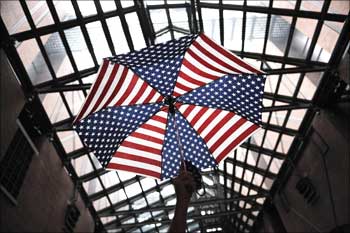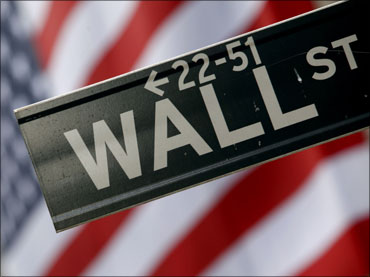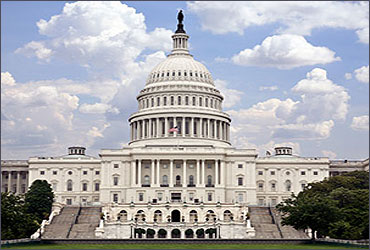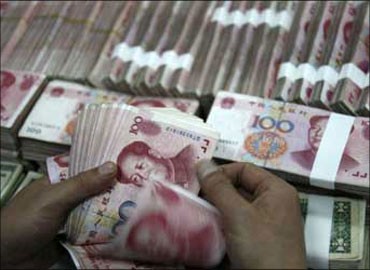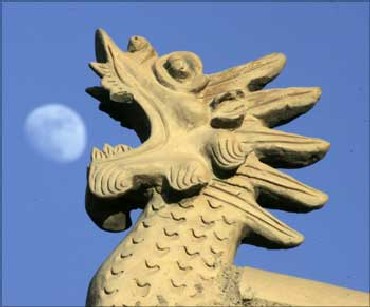 | « Back to article | Print this article |
Why China is at America's mercy
"So how was the movie?" my roommate asked, after I had just finished watching the all-time classic Gone with the Wind."
"It was nice. And I loved the last line," was my reply.
"Last line?" she asked.
"Yeah, in which Rhett Butler, the hero of the film, tells the heroine, Scarlett O'Hara, 'Frankly, my dear, I don't give a damn'."
"Oh, my. That's some line."
"Yeah, it is. And it's so true even about the world that we live in."
"There you go again, talking in that roundabout manner of yours. Please explain."
"So let me start at the very beginning."
"Oh. But doesn't everything start at the very beginning?" she interrupted.
"Yes, it does. Can I continue?"
"Yes, of course," she said.
"So somewhere over the last 20 years, China became the factory and the outsourcing capital of the world. Everything from Nike shoes to Dell PCs were made in China. A lot of this stuff made in China was exported to other parts of the world."
Click NEXT to read on . . .
Why China is at America's mercy
"Yeah, I know. Like my laptop is 'Made in China'," she said.
"Hmm. But a major part of the Chinese exports was to the United States. For these exports the Chinese exporters earned US dollars. When these dollars came back to China, the People's Bank of China, the Chinese Central Bank, bought these dollars and gave the Chinese currency renminbi to the exporters."
I went on: "This helped in maintaining a peg between the Chinese renminbi (also known as the Yuan) and the US dollar."
"Peg? What has a 'peg' got to do with currencies?" my roommate interrupted again.
"That wasn't funny at all. The Chinese government ensured that the US dollar could be converted into the renminbi at a fixed rate. One dollar was worth 8.27 renminbi between1997 to 2005. Now how did this work?"
"Yeah. How did it work? I haven't understood this at all!"
Click NEXT to read on . . .
Why China is at America's mercy
"See, if a normal currency market functions, things would work like this. The Chinese exporter exports goods to the United States. He earns dollars in the process. But his expenses are in China. He has to pay taxes in China. And so he needs the renminbi."
"So," I said, "when he gets his money back to China he converts those dollars into renminbi. Now with exports growing big time in China, every time dollars are converted into renminbi, the demand for renminbi goes up. With the demand for renminbi going up, the renminbi gains in value against the US dollar and this would have hurt the exporters."
"I still don't understand," she replied.
"Okay, let me give you an example. Let's say an exporter exports goods worth a million dollars to the US in the year 2004. When he gets the money back into China he gets 8.27 million renminbi (1million x 8.27). Now for the sake assumption, let us assume that the demand for the renminbi has gone up and one dollar is now worth only eight renminbi now. In this case the exporter earns only 8 million renminbi instead of the 8.27 million he earned earlier. So if the domestic currency appreciates the exporters tend to lose."
Click NEXT to read on . . .
Why China is at America's mercy
"Now I get it," she replied with an expression of relief on her face.
"So the central bank keeps buying dollars and at the same time they ensure that there are enough renminbi in the market, so that the renminbi does not appreciate. But as a result of all the dollar-buying, the Chinese central bank has built up a huge amount of foreign exchange reserves. The Chinese foreign exchange reserves at the end of June 2011, stood at $3.2trillion, and that's a lot of money," I said.
"But is all that money lying in the vaults of the Chinese central bank?"
"Not at all. If it was lying in the vaults of the Chinese central bank, it wouldn't be earning any return. Of the nearly $3.2 trillion, nearly $2 trillion has been invested in financial securities issued by the US government and its entities. This money over the years has helped the US government finance its fiscal deficit. Fiscal deficit is the difference between what a government earns and what it spends. This is financed by issuing financial securities referred to as government bonds, which pay a certain rate of interest to the investor."
Click NEXT to read on . . .
Why China is at America's mercy
"Okay. That's interesting. So what has been happening all along?"
"China exports, US buys. China gets the money. The money is in turn invested in US government bonds, i.e. lent to the US. The US, in turn, buys goods from China from the money that is lent, and China earns dollars in the process. These dollars are again lent to the US and so the cycle continues."
"Oh, that's a lovely I scratch your back and you scratch mine, kind of routine that has been developed," she remarked.
"Yes, it is. So that has led to China having nearly $2 trillion of their foreign exchange reserves in US dollar-based assets."
"And is that a problem?"
"Yes, it is. The total government debt of the US is now around $14.3 trillion. Other than China, the other big debtors of the US are Japan, Saudi Arabia, etc. And the US government wants to raise more debt. On August 2, 2011, the United States passed a law which allowed it to increase the debt level of the government by $2.4 trillion from the current level of $14.3 trillion. With this the debt to gross domestic product ratio of the US is almost 100 per cent now."
Click NEXT to read on . . .
Why China is at America's mercy
"And that's why the rating agency Standard and Poor's downgraded US government debt (basically financial securities issued by the US government to finance its fiscal deficit) to AA+ from its current AAA rating, a rating it first awarded the US way back in 1941. AAA rating is the best rating any financial security can get from Standards & Poors. It tells the investor that any financial security with an AAA rating is the safest security to invest in with chances of default being next to zero. AA+ rating is one level lower, and hence a tad riskier," I explained further.
"So that means that the debt has reached dangerous proportions now?" she asked.
"Yes, it has. Other than borrowing money big time, the US government has also gone ahead and printed a lot of US dollars since the financial crisis began. Estimates suggest that $2.3 trillion of the money has been created since the September 2008, when the financial crisis first exploded. So both these things do not augur well for the US dollar."
"And what is China doing about this?"
"Well, what can they really do! As the famous British economist John Maynard Keynes remarked, 'If you owe your bank a hundred pounds, you have a problem. But if you owe a million, the has a problem.' So China clearly has a problem. Of late, they have been making some aggressive noises about this. The Chinese rating agency, Dagong Global Credit Rating, downgraded US-government's debt from A+ to single-A. AAA rating is the highest credit rating that the agency issues. An A rating is two notches below. A senior Chinese official even asked the US to 'cure its addiction to debts and learn to live within its means'. Estimates suggest that for the first four months of this year, China invested nearly 75 per cent of its foreign exchange surplus in non US dollar assets."
Click NEXT to read on . . .
Why China is at America's mercy
"So they are getting aggressive with the US, the Chinese are?"
"Yes, they are. But where else will they go? Europe is in big trouble anyway. Plus the kind of foreign exchange they generate, only the US bond markets have the ability to absorb. There has been news going around that they are quietly buying gold, other metals and physical assets as well. But these markets are not big enough to satisfy Chinese demand."
"So that leaves them very vulnerable, if the US dollar were to crash?" asked my friend.
"Yes, it does. They are in a Catch-22 situation. As far as the US is concerned, it can default on all the money it owes to China or happily continue to borrow more and even tell China: 'Frankly, my dear, I don't give a damn'."
The author can be reached at shonalee.biswas@rediffmail.com


